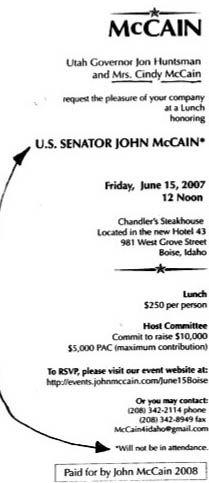We didn't specially disagree with the Washington Supreme Court decision a month ago in State v. Athan (May 10), when the court upheld a conviction developed from police work that involved a ruse. In that case, police tricked a man into licking an envelope shut and sending it to them, thereby providing the DNA sample they needed to nail him in a child abuse case.
The decision felt right on balance, but it carried some seeds of uneasiness within. One reason had to do with the allowed looseness in obtaining DNA; this is likely to be a troubling area of the law for some time. The other was the fact of the ruse the police used in obtaining it. Police use deception of one sort or another from time to time in crime investigation; journalists sometimes do too, and so do others. On occasion it's warranted, and the Washington court seemed to want to make clear that the use of deception in and of itself isn't necessarily improper.
And we can go along with that. But what would the court say about a recent case from just south of the Columbia River - this (as reported in the Wired blog Threat Level)?
On December 18, 2004, Ascension Alverez-Tejeda and his girlfriend were stopped at a traffic light near La Pine Oregon, and when the light turned green, the car in front of them stalled. Alverez-Tejeda stopped in time but a pickup truck behind him rear-ended him. When he got out to look at his bumper, the police showed up and arrested the truck driver for drinking and driving. The cops then convinced Alverez-Tejeda and his girlfriend to go to a nearby parking lot, ordered them out of their car and into in the back of the cop car for 'processing.' While they were in the cruiser, a person jumped in their car and took off. The cops ordered the pair out and set off in full pursuit up the road. A few minutes later, the stolen car comes flying back down the road with the police cruiser in pursuit. The pursuing officer returns alone with the woman's purse, telling the duo that the carjacker thrown it out the car window and escaped. The woman is so upset she hurls and the police put the distraught couple up in a motel.
But it was all a set up worthy of David Mamet. DEA agents were tracking a drug gang and had bought drugs out of the car months earlier, though not when Alverez-Tejeda was there. Using wiretaps and surveillance, the DEA learned that Alverez-Tejeda was using the leader's car to transport illicit drugs. The agents then decided to stage something, perhaps even a carjacking, in order to seize the drugs without tipping off the conspirators. They never consulted a judge, but every person in the story, other than Alverez-Tejeda and his girlfriend, was a cop of some sort.
Let's sum up. Here's what Daily Kos drew out: "They not only damaged the car, they quite literally stole it and the couple's personal effects - all without a warrant. When they did go to get a warrant, they lied to the judge about the circumstances. In the meantime, they held the couple essentially hostage without even letting them know they were under investigation."
Friday, the 9th Circuit Court of Appeals said all this was legal.
And your civil rights just shrank, again . . .

 Highway 520 bridge/Wikipedia
Highway 520 bridge/Wikipedia Northern Spotted Owl/U.S. Fish & Wildlife
Northern Spotted Owl/U.S. Fish & Wildlife An invitation
An invitation